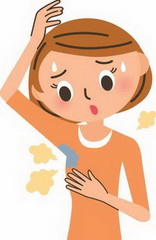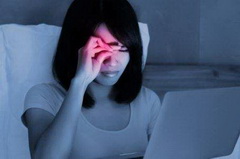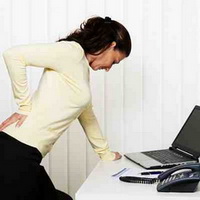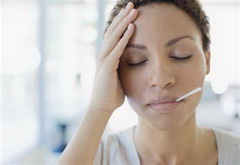Postpartum sweating and related syndromes:an introduction of postpartum persistent vacuity sweating, night sweating, depression sweating and unable to recognize people, and other related syndromes.
-
 ✵Gynecology of TCM is a branch to study the physiological and pathological characteristics of women and to prevent and treat syndromes specific to women. Gynecology of TCM research scope including irregular menstruation, amenia, metrorrhagia, infertility, postpartum syndromes, breast syndromes, and miscellaneous syndromes, etc.
✵Gynecology of TCM is a branch to study the physiological and pathological characteristics of women and to prevent and treat syndromes specific to women. Gynecology of TCM research scope including irregular menstruation, amenia, metrorrhagia, infertility, postpartum syndromes, breast syndromes, and miscellaneous syndromes, etc.
- Postpartum sweating and related syndromes.
-
✵Postpartum sweating and related syndromes are also known as a sweating syndrome and related syndromes of women after childbirth, a series of sweating syndromes of women following childbirth. It is also known as perspiration syndromes after childbirth.
✧ In the TCM system, the pathogenic reasons for the sweating and related syndromes normally are deficiency of Yin, loss of blood in childbirth, and excess of Yang, Qi excess, interior deficiency and exterior excess, Yang going externally, deficiency of Qi and blood, weakness of the Wei system, asthenia, exogenous wind pathogen, coldness, etc. Common related symptoms observed are sweating or much sweating, persistent vacuity sweating, night sweating, etc. The other sweating related syndromes are understood due to similar reasons and also specific reasons, with similar symptoms and specific symptoms observed.
✵The women sweating syndromes after childbirth, and sweating related syndromes are introduced: postpartum persistent vacuity sweating, postpartum night sweating, postpartum depression sweating and unable to recognize people, postpartum hydrosis and spasmodic syndrome, postpartum stagnancy-heat and beriberi, etc.
- Postpartum persistent vacuity sweating.
-

✵The postpartum persistent vacuity sweating is the persistent vacuity sweating occurring following childbirth, due to various pathogenic reasons. It is also known as persistent vacuity sweating after childbirth, or deficient perspiration after childbirth.
✧ In the TCM system, the pathogenic reasons for the postpartum persistent vacuity sweating normally are deficiency of Yin, and excess of Yang, interior deficiency, and exterior excess, Yang going externally, thus lead to perspiration. Loss of blood in childbirth, and Yin deficiency, Qi excess and affect Yin, lead to perspiration.
✵The postpartum persistent vacuity sweating common types are known including:
✧⑴.A woman suffers from postpartum persistent vacuity sweating, deficiency of blood and Qi, much sweating, affected by wind and changed to convulsion. If not transmitted to convulsion, then deficiency and short of breath, body thin, dry mouth and dry lips, menses stop, exhaustion of body fluid. This is the syndrome of postpartum persistent vacuity sweating due to the deficiency of blood and Qi;
✧⑵...., wind stroke, difficulty in urination, mild limb spasm, difficulty in bending and stretching, this is the syndrome of postpartum persistent vacuity sweating due to wind stroke;
✧⑶...., incessant persistent perspiration, sudden deficiency of blood and Qi. This is the syndrome of postpartum persistent vacuity sweating due to blood and Qi deficiency.
✧⑷...., incessant night sweating, much sweating.
✧⑸...., various deficiency and insufficiency, fever and night sweating. This is the syndrome of postpartum persistent vacuity sweating due to deficiency.
✵Ancient herbalists who hold a syndrome differentiation viewpoint with similar explain of pathogenic reasons, and the relevant representative work are introduced and quoted:"Case a woman suffers from persistent vacuity sweating(deficient perspiration) after childbirth, due to Yin deficiency, and affected by wind pathogen,...In the case excessive sweating could not be wiped with hands, incurable." [02].
"Case a woman suffers from sweating during childbearing, for the reasons strain hurt the spleen viscus, frightening hurt the heart viscus, anger hurt the liver viscus. As the ancient works Nei Jing(the Yellow Emperor's Inner Canon) said: suffers from strain and hard-working, sweating comes from the spleen; Got frightened and the essence is robbed, sweating comes from the heart; there are fearsome, sweating comes from the liver. In most cases, a woman in childbirth sweating from above three reasons...the sweating is liquid of the heart, flows internally it is the blood, overflow out it turns to sweat, in the condition after childbirth and loss of blood then much sweating, due to strain frightening hurt and weak in vitality, could not guard the body liquid...; Till in the condition (a woman) takes ginseng or astragalus in big dose but still sweating from the head but not (sweat) at the waist and feet, is the case in danger." [03].
"Case after childbirth, a woman suffers from vacuity sweating, unstoppable. Other symptoms observed are: deficiency depletion with much sweating, thirst, blood clot and no pains, aversion to wind and cold, much sweating of a fat person." [03].
"A woman suffers from blood deficiency and reverses cold at the lower body part after childbirth, sole Yang going out upward, as a result, only sweating on the head, in case of no sweating after childbirth, loss Yin and blood deficiency...; In case sweating much and heavily, is the condition of Yang collapse..." [05].
"A woman suffers from Yin deficiency with heat after childbirth, she is also affected by wind pathogen, vacuity sweating and unstoppable..., In case of Yin deficiency and night sweating..." [06].
"Unstoppable sweating after childbirth and develops:...a woman lose excessive volume of blood after childbirth, ...as a result, easily perspire. She should be treated urgently, in case wind and cold affection by chance and it will develop to other syndromes..." [07].Different types are introduced:
⑴.A woman suffers from dizziness dazzled and sweating, is the syndrome known as stomach sweating, a condition extreme deficiency... In general, this is a syndrome in risks, very difficult to save.
⑵.A woman suffers from sweating unstoppable, also affected by wind pathogen, suddenly unconscious and fall, facial paralysis, spasm and contracture of hands and feet, similar to opisthotonus, is the syndrome of Jing(spasm)...this is also a syndrome in risks, difficult to save.
⑶.A woman suffers from pain from blood clots, ...in case very tired and lassitude, sweating, collapse in appearance and complexion...; In case...sweating is not stoppable, surely develops to sweating convulsion(Rou Jing)...; In case (she) take a heavy dosage of Cen and Qi(Ginseng and Astragalus) but much sweating and sweating is unstoppable, and in case sweating on the head but not sweating at body part below the waist and feet, it is difficult to save."Sweating in a critical stage after childbirth: a woman collapse in appearance and complexion just after childbirth, sweating vividly, is the condition of sweating in a critical stage..." [07].
"Sweating after childbirth: a woman suffers from profuse sweating and unstoppable(excessive perspiration and could not be relieved) and sweating on the forehead like rains, no urine, is the syndrome of Yang collapse and blood exhaust, following by Qi exhaust...; In case slight sweating on the forehead, no sweating on the body, urination is uninhibited, defecation color is black, it is the syndrome of blood stasis force heat to flow upward...; In case urination is inhibited and panting cough, is the syndrome of water Qi...; In case (sweating) not due to blood stasis or water dampness, then these are symptoms of Yang collapse syndrome..." [08].
- Postpartum night sweating.
-

✵The postpartum night sweating is the night sweating occurring following childbirth, different from the spontaneous perspiration. It is also known as night sweating after childbirth, or night perspiration after childbirth.
✧ In the TCM system, the pathogenic reasons for the postpartum night sweating normally are deficiency of Qi and blood, weakness of the Wei system.
✵Ancient herbalists who hold a syndrome differentiation viewpoint with similar explain of pathogenic reasons, and the relevant representative work are introduced and quoted:"After childbirth, a woman suffers from sweating in sleeping, sweating stopped when waking up, it is the condition of the night sweating, not the same as spontaneous perspiration." [03].
"A woman suffers from a hundred(many) syndromes after childbirth, there are three serious syndromes among them, what are they? The three serious syndromes are vomit, diarrhea, night sweating. In the condition one serious syndrome observed, it is not easy to treat, if all the three serious syndromes occurred, it is in risk conditions. The syndrome with serious symptoms should be treated first, and then for other syndromes." [04].
- Postpartum depression sweating and unable to recognize people.
-

✵The postpartum depression sweating and unable to recognize people is a case of depression sweating and unconscious occurring following childbirth, due to various pathogenic reasons. It is also known as depression sweating and unable to recognize people after childbirth.
✧ In the TCM system, the pathogenic reasons for the postpartum depression sweating and unable to recognize people normally are sudden deficiency and asthenia.
✵The postpartum depression sweating and unable to recognize people common types are known including:
✧⑴.A woman suffers from depression sweating and unable to recognize people after childbirth, sudden deficiency, coma and unconscious in a long time, or frequently recurrent attack, this is the case of postpartum depression sweating and unable to recognize people due to wind and sudden deficiency, or loss excessive volume of blood.
- Postpartum hydrosis and spasmodic syndrome(postpartum convulsion).
-

✵The postpartum hydrosis and spasmodic syndrome(postpartum convulsion) is hydrosis and convulsion occurring following childbirth, usually due to various pathogenic reasons.
✧ In the TCM system, the pathogenic reasons for the postpartum hydrosis and spasmodic syndrome(postpartum convulsion) normally are blood deficiency, thus excessive sweating, affected by wind, and develops to convulsion.
✵The postpartum hydrosis and spasmodic syndrome(postpartum convulsion) common types are known including:
✧⑴.A woman suffers from postpartum hydrosis and spasmodic syndrome(postpartum convulsion), hard spasm(tense convulsion) or flaccid limbs(sweating convulsion), and weak feet, unable to move around. Ancient theory differentiates hard and flaccid limbs according to perspiration or not perspiration, to differentiate between Yin and Yang. The treatment should follow principles dissipate wind, and eliminate blood accumulation.
✧⑵...., wind stroke, lockjaw, for the pathogenic reason including deficiency in blood and Qi, pathogenic wind affects the muscle of the jaw and cheek, the muscle of the hand three Yang connect to the jaw, the childbirth will hurt the Zang and Fu-viscera and hurt the muscle and vessels, once affected by wind, the muscle of vessels of hand Three Yang combat against it, the muscle will turn spasm and lead to lockjaw. In the cases opisthotonus(opisthotonos), deficiency and is affected by wind, the wind enters into Yang Meridians, the Yin and Yang meridians circulate around the body, once the wind pathogen affects and enter into the Yang meridians, lead to opisthotonus, spasm, and (body) shape turns similar to a bow. Other symptoms that might be observed are blood dizziness(anemic fainting), orthocolosis(rigidity of limbs, the stiffness of extremities), lose consciousness, vomiting, and diarrhea.
✧⑶...., wind stroke, unconscious, vomit saliva, spasm of hands and feet.
✧⑷...., wind stroke, deficiency and could not take other recipes.
✧⑸...., wind stroke and convulsion, lockjaw and cyanotic face, stiffness of the hands and feet.
✧⑹...., stiffness of the abdomen, bilateral hypochondriac distension, the coldness of hands and feet, heat and vexation in the heart and want to drink water, dry retching, the strain of joint, wind stroke.
✧⑺...., wind stroke, wind type convulsion, cold and stiffness, lockjaw and could not recognize people(unconscious).
✧⑻...., wind stroke, rigid lumbus and back, opisthotonus, is the case of wind convulsion.
- Postpartum stagnancy-heat and beriberi.
-

✵The postpartum stagnancy-heat and beriberi is a syndrome of stagnancy-heat and beriberi occurring following childbirth, due to various pathogenic reasons.
✧ In the TCM system, the pathogenic reasons for the postpartum stagnancy-heat and beriberi normally are stiflingly hot, blood deficiency and generate heat, affected by coolness and coldness in spring and summer, symptoms are beriberi, palpitation and vexed, vomit and Qi counter flow upward.
✵The postpartum stagnancy-heat and beriberi common types are known including:
✧⑴.A woman suffers from postpartum stagnancy-heat and beriberi, cold pathogen affects three Yang channels, cold.
✧⑵...., heat pathogen affect three Yin channels, heat(or fever).
References:
-
- 01.Postpartum sweating and related syndromes:an introduction of postpartum persistent vacuity sweating, night sweating, depression sweating and unable to recognize people, and other related syndromes.
- 02.Song Shi Nǚ Ke Cuo Yao(the Synopsis of Song's Gynaecology).By 宋林皋(Sòng Lín Gāo)[Ming].
- 03.Jiēzhāi Gōng Tāi Chǎn Yī àn(Births Cases of Jie Zhai Gong).By 王纶(Wáng Guān)[Ming].
- 04.Fù Kē Bǎi Biàn(the Differentiations in Hundred Syndromes of Gynaecology).By 庄履严(Zhuāng Lǚyán)[Ming].
- 05.Huang Shi Nǚ Ke(the Synopsis of Huang's Gynaecology).By 黄彦荣(Huáng Yànróng)[Ming,1504].
- 06.Ye Shi Nǚ Ke Zhèng Zhì(the Syndromes and Therapeutics of Ye's Gynaecology).By 叶桂(Yè Guì)[1817].
- 07.Fù Kē Bèi Kǎo(the References of Gynaecology).By 何应豫(Hé Yīngyù)[1820].
- 08.Fù Kē Liáng Fāng(the Effective Prescription of Gynecology).By 何梦瑶(Hé Mèngyáo)[1751].
